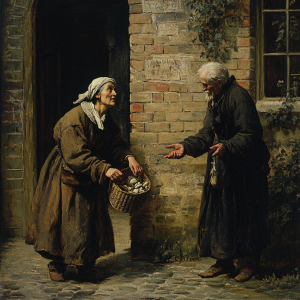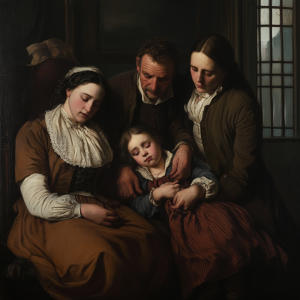
Widows were at risk of “Warning Out”
I discovered something interesting as it relates to living self-sufficiently and I just had to share it with you. It serves as some profound food for thought.
In the annals of early American history, few practices reveal the harsh realities of colonial life quite like “warning out.” This legal procedure, common in New England during the 17th and 18th centuries, was ostensibly designed to protect town resources from the burden of supporting indigent newcomers. However, its implementation often led to cruel outcomes, tearing families apart and leaving society’s most vulnerable members without support or refuge.
The roots of “warning out” can be traced back to English poor laws, which stipulated that each parish was responsible for its own poor based on who was born in their parish. As colonists established new communities in America, they brought this concept with them, adapting it to the challenges of frontier life. In its simplest form, “warning out” involved town officials formally notifying new arrivals that they were not recognized as legal residents and therefore had no claim to poor relief or other town resources.
The process was straightforward but fraught with consequences. When a new person or family arrived in a town, local officials would dispatch a constable to deliver the warning, which was then recorded in town records. This legal maneuver effectively absolved the town of any responsibility for the newcomers’ welfare. If the warned-out individuals fell on hard times, they could be forcibly removed to their place of birth, recognized as their place of legal residence, regardless of the personal hardships this might entail.

Warning out could separate families
The story of the Johnson family serves as a poignant illustration of the devastating impact warning out could have on families seeking a better life. The Johnsons, like many others, were moving westward in search of new opportunities. However, their dreams were shattered when they received a warning out notice from the town they hoped to call home. The cruel twist in their tale lay in the fact that each family member had a different place of legal residence: the father hailed from one town, the mother from another, and their three children were each born in separate locations.
Faced with the warning out order, the Johnson family was torn apart. Each member was forcibly returned to their place of birth, separated from their loved ones with no recourse or appeal. The father, mother, and three children found themselves scattered across different towns, never to see each other again. This heart-wrenching outcome, uncovered through genealogical research, stands as a stark reminder of the human cost of such rigid and unforgiving policies.
The Johnsons’ story was far from unique. Warning out disproportionately affected society’s most vulnerable members, including unwed mothers, widows, and aging war veterans. For unwed mothers, the practice compounded societal stigma with a lack of material support, often forcing them to choose between separation from their child or exile from their community. Widows, often because of the sacrifice their husband’s made to the war efforts, suddenly bereft of a provider, faced the daunting task of maintaining residency without a male head of household, their precarious situation often leading to poverty and displacement.
Perhaps most ironically, war veterans who had fought to protect their communities could find themselves warned out if injuries or trauma left them unable to work. The very people who had sacrificed for the common good were at risk of being cast out when they needed support the most. This cruel irony underscored the often shortsighted nature of the warning out practice.
The elderly were particularly vulnerable to the harsh realities of this system. As people aged and their ability to contribute economically diminished, they faced the grim prospect of being seen as potential burdens on town resources. This led to the macabre practice of elderly residents saving for their own coffins, hoping that by covering this final expense, they might avoid being warned out in their twilight years. The fact that even the cost of a coffin was viewed unfavorably by town officials speaks volumes about the extreme emphasis placed on self-sufficiency in colonial society.
The Mechanics of Warning Out: Timeframes and Property Ownership
Understanding the specific mechanics of warning out sheds light on the precarious situation faced by newcomers in colonial New England towns. The process was not uniform across all communities, but certain patterns emerged that illustrate the challenges of establishing oneself in a new location.
Timeframes for proving self-sufficiency varied considerably from town to town. In some cases, newcomers could face an almost immediate warning out, sometimes within days or weeks of their arrival. This swift action was often more of a legal precaution by the town rather than an immediate demand for expulsion. It allowed officials to retain the right to remove individuals or families if they became a burden in the future.
Many New England towns adopted what became known as the “three-month rule.” Under this guideline, if a person or family managed to reside in the town for three consecutive months without being warned out, they could claim legal settlement and the right to poor relief if needed. This provided a clear, if challenging, target for newcomers striving to establish themselves.
Other locations set the bar even higher, requiring a full year of residency before granting settlement rights. During this probationary period, newcomers needed to demonstrate their ability to support themselves without becoming a burden on town resources. This extended timeframe could be particularly daunting for families like the Johnsons, who had to sustain themselves for a considerable period while facing uncertainty about their future status.

Soldiers settling were at risk of warning out
Some towns offered a financial workaround known as “caution money.” This was essentially a security deposit paid either by the newcomers themselves or by their former town of residence. This payment served as insurance against the possibility of the newcomers requiring poor relief in the future, allowing them to stay even if they hadn’t yet established long-term self-sufficiency.
Crucially, many towns tied residency rights directly to property ownership. This requirement added another significant hurdle for newcomers, particularly those of limited means. Owning property was seen as a tangible demonstration of financial stability and commitment to the community. For families like the Johnsons, who were likely moving in search of better opportunities, the need to immediately purchase property could have been an insurmountable obstacle.
The property ownership requirement underscores the deep-seated belief in self-sufficiency that permeated colonial society. It effectively created a two-tiered system: those who could afford to buy property could quickly establish themselves as community members, while those without such means remained in a precarious position, constantly at risk of being warned out.
It’s worth noting that the enforcement of warning out, including timeframes and property requirements, wasn’t always strict or consistent. Towns often selectively applied these rules, allowing productive residents to stay even if they had been technically warned out or hadn’t met all the formal requirements for settlement. This discretionary approach could lead to uneven application of the law, potentially exacerbating existing social and economic inequalities.
As the 18th century progressed, the practice of warning out began to decline. Increased population mobility, changing attitudes towards poverty, and the emergence of new forms of poor relief all contributed to its gradual disappearance. However, the legacy of warning out continued to shape American attitudes towards self-sufficiency and community responsibility for generations to come.
Reflecting on the practice of warning out provides valuable insights into the complex interplay between community resources and individual needs in early American society. It serves as a stark reminder of the potential for well-intentioned policies to result in profound human suffering when taken to extremes. The story of the Johnson family and countless others like them challenges us to consider the true meaning of community and the importance of compassionate policies in building strong, resilient societies.


